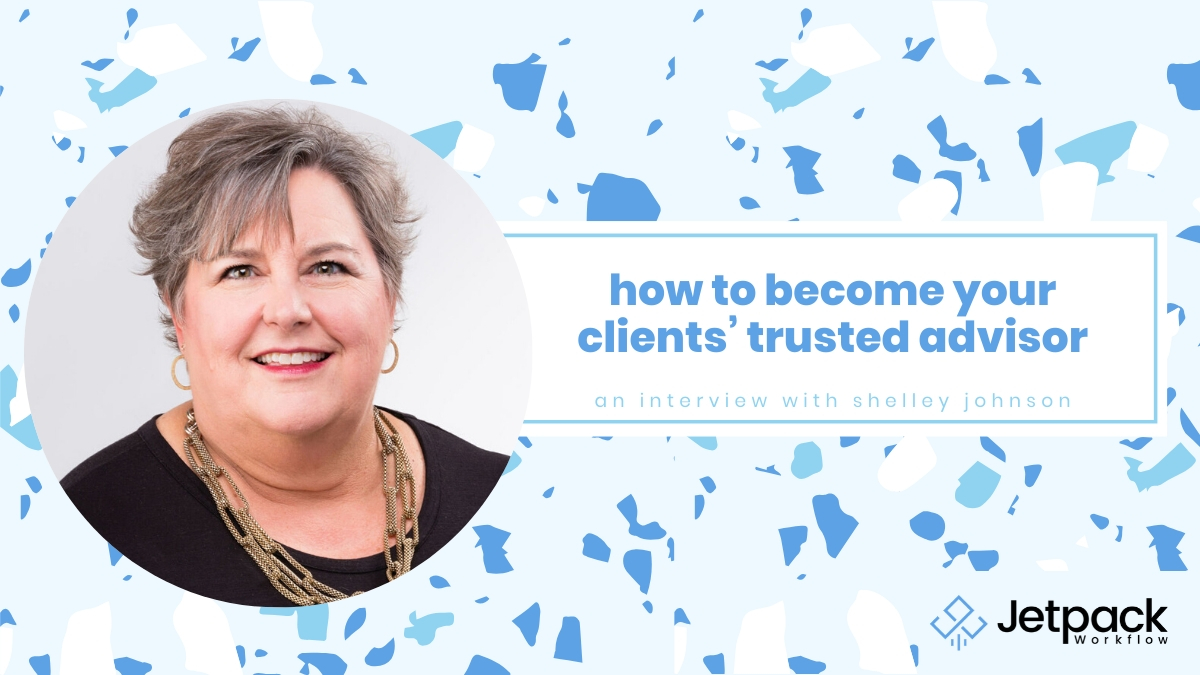How To Become Your Clients’ Trusted Advisor

Shelley Johnson worked many years under her mentor, Bruce Allman, until one day he gave her the opportunity to take over the entire firm. In 2010, Shelley re-opened the doors to Allman Johnson CPA’s. Shelley’s motto is to “Become an advisor for your clients.”
Suddenly, she went from a more managerial role to now having to focus on: cashflow, new technology changes in the accounting industry, client growth and more.
She admits she is still growing, learning and adapting to her new role as the Owner, but she’s made incredible strides. Her firm was named a “Firm of the Future” by Intuit.
You will hear why.
In this interview with David Cristello, of Jetpack Workflow Software, you will hear Shelley elaborate on:
- Organic growth of your firm and why it is still important
- The steps to becoming a trusted advisor with your clients so they are long-term clients and pay more
- The importance of finding other firm owners to mastermind and go over issues with
- Even with the “Firm of the Future” tag, she has loftier goals she aspires to. David and Shelley discuss those near the end
- Allman Johnson CPA’s
- Interview with LiveCA – “Mushy” points
- Interview with Darren Root – “RootWorks”
“Fortunate to be in the Right Place”
For over 20 years, Shelley Johnson worked under someone she called her “mentor.” Bruce Allman. Shelley started with Bruce under a different firm name in 1990. Bruce guided her craft, her understanding of running a firm and managing people and clients.
“Bruce made sure I wouldn’t fail.” If the job he gave her was working out, he already had another position in mind as a back-up. The firm was traditional — working with individuals and businesses that came in the door.
In 1995, Shelley became a minority owner in the business and the name changed to its current form “Allman Johnson CPAs.” For 15 years, the firm grew organically, Shelley ran more of the accounting arm of the business while Bruce managed cash flow and the health of the firm for the most part.
Then, in 2010, Bruce offered Shelley an amazing opportunity. The opportunity to run the firm and own majority stake. Shelley jumped on the opportunity. She was now the Owner and head of Allman Johnson & CPA’s.
The First Years as Head of Her Own Firm:
It was tempting to immediately start changing many things right when she became Owner; however, she knew, to keep her team in place, she needed to move at a comfortable rate.
For the first couple of years, she allowed the firm to grow organically. Shelley needed to start running the day-to-day cashflow and operations (very important in a firm’s viability).
“Everything went smoothly.”
One of her first major changes was to move all client files onto a digital platform rather than physical copies. She saw a shift in how technology was disrupting the CPA space, so she made the quick transition to start storing everything digitally.
She learned quickly the importance of “communication” within her staff. Due to some of her technological advancements, she lost employees because of it.
Sometimes employees get into a groove of doing their regular job day-in and day-out and might not be receptive to change. Before any major changes in processes and technology, Shelley learned to always discuss and be open with your team to make sure the transitions go smoothly.
If members of your team are against it, it does not mean you should not continue progressing. It’s then you need to evaluate the needs of the firm, the importance of the changes, and whether you are willing to risk losing certain employees to grow your firm.
“The more you communicate with your team on the ‘vision’, the easier it gets to make changes. You need to talk about everything more globally.”
Finding a “Mastermind” With Other Firm Owners:
As Shelley worked through many of the growing pains, she found Rootworks (David interviewed the founder Darren Root on the podcast) and learned the power of having a Mastermind. Rootworks helped her with coaching but what she found with having a Mastermind:
“The big takeaway was ‘I’m not the only one going through this.’ “
Many other CPA firm owners had many of the issues Shelley experienced. Getting to see these other owners as peers and not as competition allowed open conversation and problem-solving.
Shelley Recommends How to Find a Great Mastermind:
- Find other owners who are in the same position as you [same size]
- Find a community that fosters a Mastermind [she recommends Rootworks]
- Be open to discussion and listening to others [everyone’s there to help and learn]
How to Become a Trusted Advisor to Your Clients — Not Just a “Paper Cruncher”
Shelley saw in her firm, and from hearing about other firms, how easy it was to be just a “paper cruncher” for your clients: You do their tax return, their planning, some bookkeeping and that’s it. There has to be more advising between ourselves and clients, she thought.
The issue was many clients did not understand all the implications of their decisions. “They don’t know what they don’t know” comes to mind. As an advisor, you learn everything the client goes through:
- Their daily struggles
- Their big plans for the future
- What’s going on in their personal life that might affect the financial picture
All of these points (and more) need to be regularly discussed rather than just collecting information at tax time.
For example, one client was buying up a few companies and planned to simply combine all the equipment. Shelley stepped in and explained how it wasn’t that simple: there were debt and tax implications to walk through first. She was able to help them avoid any compliance issues and possibly saved on taxes.
If these discussions don’t take place, clients can make decisions without knowing the consequences.
Steps to Getting to Advisor-Status:
- Set up clients on a “fixed fee” per month so they “aren’t afraid to call you.” Let them feel comfortable with discussing issues without worrying about a large bill.
- Include regular check-in discussion points: Monthly, quarterly, semi-annually, etc.
- Have contact points where you dissect everything a client mentions. They might mention something they think is small (like combining equipment) but you need to step in and prove you’re both knowledgeable and there to help.
Aspirations for the Future:
Shelley was open in discussing how much more she aspires her firm to grow to. At the moment, she is working on a few points:
- Slowly getting clients into “value-based” pricing (a la Ron Baker)
- Making sure everything about a client is updated in a client file so they can continue to act as a trusted advisor
- Tracking the service lines to see which are the most profitable
- Testing many ways to stay profitable and stay on scope simultaneously
- Doing more with social media
- Working to not get pressured to focus so much on marketing rather than being patient with organic growth. “It’s fun to do marketing but you also need to look at the organic side: Which client of mine needs attention right now?”
Shelley continues to build her firm and is recognized for much of her work in the accounting space. She preaches being an advisor for your clients because they need your specialized knowledge.
The next time you think “You are just a CPA”, remember what Shelley says: She puts this on her Linkedin profile:
“CPAs are many things. They are chief financial officers for Fortune 500 companies and advisors to small neighborhood businesses. They work for public accounting firms, both small and large. They are well-respected strategic business advisors and decision-makers. They act as consultants on many issues, including taxes and accounting.
A CPA, or Certified Public Accountant, is a trusted financial advisor who helps individuals, businesses, and other organizations plan and reach their financial goals. Whatever those goals-saving for a new home, opening a new office, or planning a multi-billion dollar merger-CPAs can help.” – Shelley Johnson
Related Articles:






